In our rich 60-plus-year history, Council for a Livable World has pushed for policies that will make the world safer from nuclear threats. Whether we are engaging on Capitol Hill or motivating our supporters around the country to contact their representatives, we are advocating for what our founder called “the sweet voice of reason” when it comes to the most dangerous weapons ever created.
It is easy to look at the threats posed by weapons of mass destruction and assume there is nothing you can do. But you can do something — in fact, the biggest successes in nuclear risk reduction were driven by everyday people demanding that their leaders step back from the nuclear brink.
What You Can Do
You have the power to effect change in nuclear weapons policy by letting your Member of Congress know you care about these issues. You can also take action simply by reading more about these issues, talking about them with your friends, and sharing posts about them on social media. Follow the Council on Facebook, X(formerly Twitter), Instagram, BlueSky and Threads to stay up to date on the latest nuclear weapons news.
Join our email list to be among the first to know when hearings and votes take place on these and other critical national security issues.
We have also just implemented a new tool to help you reach out to your Members of Congress DIRECTLY about relevant legislation. When you scroll down, you’ll see a button under each issue with relevant legislation that will allow you to contact your Senators and Representative about these issues with just a few clicks.
Finally, you can take action on these issues by using our forms to donate to our endorsed candidates when we are in cycle. Cycles typically begin the summer of off-election years; the 2024 endorsement cycle, for example, began in June 2023. The donations will go directly to candidate campaigns, but will be earmarked as coming from a Council supporter, so campaigns will know that their supporters care about minimizing nuclear threats.
Our Issues
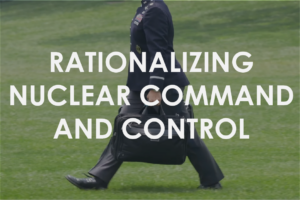 Rationalizing Nuclear Command and Control
Rationalizing Nuclear Command and Control
As it currently stands, the President of the United States alone could theoretically order a nuclear first strike. This is a leftover from the Cold War era when such an arrangement was perceived as necessary for deterrence. Since 2016, champions in the House and Senate have introduced two critical bills to prevent the United States from launching a nuclear first strike — but not retaliating against one — and that would require Congressional approval before any nuclear first strike, as it would fall under Congressional authority to declare war. Keeping the threat of a nuclear first strike on the table is outdated, unnecessary and inconsistent with the policy supported by every President since the Cold War that U.S. nuclear weapons are intended for defense and deterrence.
Learn more about Nuclear Command and Control from the Council’s sister organization, the Center for Arms Control and Non-Proliferation: First Use Policies and the Risk of Escalation | No First Use: Myths vs. Realities | No First Use: Frequently Asked Questions | Executive Director and Former Congressman John Tierney on Why Abolishing the ‘Thermonuclear Monarchy’ Should Be Bipartisan
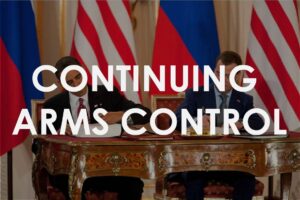 Continuing Arms Control
Continuing Arms Control
The Council was instrumental in building support for the New Strategic Arms Reduction Treaty (New START), which successfully reduced the number of deployed U.S. and Russian nuclear warheads to the lowest levels since the 1950s. This agreement expires in 2026, and due to Russia’s invasion of Ukraine, talks on a potential follow-on agreement stalled at a critical time. Given Russia’s use of nuclear threats to support its war, the importance of arms control should be clearer than ever. The United States and Russia must continue reducing their nuclear weapons stockpiles consider bringing rising nuclear powers like China into new arms control agreements. A new nuclear arms race is in no one’s interest.
Learn more about arms control from the Council’s sister organization, the Center for Arms Control and Non-Proliferation: Fact Sheet: The New Strategic Arms Reduction Treaty (New START) | FAQs: Nuclear Issues in the Ukraine Crisis | Fact Sheet: China’s Nuclear Inventory | Infographic: World Nuclear Inventories
Urge your Senators and Representative to Support Arms Control
 Championing Non-Proliferation
Championing Non-Proliferation
Arms control cannot be effective if more states are acquiring nuclear weapons. The Council supports a diplomacy-based approach to limiting the spread of nuclear weapons by means of resolving regional disputes that undermine stability, strong export controls and dialogue between governments.
Learn more about non-proliferation from the Council’s sister organization, the Center for Arms Control and Non-Proliferation: Fact Sheet: Civil Nuclear Cooperation Agreements | Fact Sheet: Nuclear Proliferation Risks in Nuclear Energy Programs | Fact Sheet: Nuclear Terrorism: A Clear and Present Danger | Fact Sheet: Nuclear-Weapon-Free-Zones
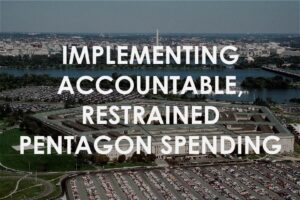 Implementing Accountable, Restrained Pentagon Spending
Implementing Accountable, Restrained Pentagon Spending
Pentagon spending is unacceptably high, and the Department of Defense is riddled with well-documented issues with financial accountability like its inability to pass a clean audit and consistent price-gouging from contractors. The United States can and should maintain its security at lower costs. The Council offers analysis to Members of Congress and Congressional committees on various aspects of defense spending bills to endorse parts that will keep America safer and oppose parts that won’t.
Learn more about Pentagon spending from the Council’s sister organization, the Center for Arms Control and Non-Proliferation: Fact Sheet: U.S. Nuclear Weapons Modernization: Costs and Constraints | The NDAA Process, Explained | Final Summary: FY 2023 Omnibus Analysis | Final Summary: FY 2023 National Defense Authorization Act | FY 2024 Defense Budget Request Briefing Book
 Advocating on Behalf of Impacted Communities
Advocating on Behalf of Impacted Communities
Nuclear production and testing have harmed communities across the Western United States and in the Pacific Islands for decades, causing cancer and other health issues for generations of Americans and making land used for testing uninhabitable for Indigenous communities. The United States has more to do to care for its victims, so using impacted communities as our guides, Council for a Livable World is fighting on Capitol Hill to expand federal benefits for everyone affected by the U.S. nuclear weapons complex.
The Radiation Exposure Compensation Act (RECA) was enacted in 1990 and created a Department of Justice program for claims related to atmospheric nuclear testing and uranium industry employment. The program provides lump sum compensation and is part of an inter-agency network that also provides health screenings for affected people, for example. After being extended in 2022, and receiving overwhelmingly bipartisan support in the Senate in 2024, RECA expired June 7, 2024, with House Speaker Mike Johnson refusing to let it go to a floor vote.
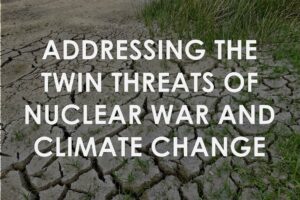 Addressing the Twin Threats of Nuclear War and Climate Change
Addressing the Twin Threats of Nuclear War and Climate Change
There are two serious threats to all life on earth: nuclear war and climate change. Both are existential, both are preventable, and both are inextricably linked through their reciprocal effects on each other. Climate change is generating conflict and instability in areas where the risk of nuclear proliferation is already high, and any use of nuclear weapons would have disastrous effects on an already fragile environment. By acknowledging the link between these two issues, we can advocate for more action on both.
 Keeping AI Out of the Launch Process
Keeping AI Out of the Launch Process
Artificial intelligence is likely to play an increasingly important role in national security, but it should not be in a position to preempt human decisions in the nuclear launch process. In 2023, bipartisan legislation was introduced to ensure that a human is always involved in the nuclear launch process. The Council has advocated for this common-sense, bipartisan measure as one of many to ensure that the United States’ most dangerous weapons are never launched by accident or mistake.
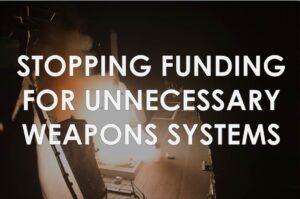 Stopping Funding for Unnecessary Weapons Systems
Stopping Funding for Unnecessary Weapons Systems
The first Trump administration’s Nuclear Posture Review called for “supplemental” capabilities in the form of new “low-yield” nuclear weapons. They are redundant and unnecessary and will only serve to waste taxpayers’ money without making anyone safer. The Pentagon is also building an expensive new ICBM that should be paused.
The Biden administration’s Nuclear Posture Review highlighted that non-proliferation, arms control and managing escalation are priorities of this administration. The Council is encouraging members of Congress to support decreasing, not increasing, U.S. reliance on nuclear weapons in foreign policy. Stopping the development of redundant, expensive new systems and reversing efforts to make nuclear weapons “usable” should be priorities.
Learn more about new nuclear weapons programs from the Council’s sister organization, the Center for Arms Control and Non-Proliferation: Analysis: Biden’s Nuclear Posture Review | Statement on the Biden Nuclear Posture Review | Fact Sheet: Nuclear Sea-Launched Cruise Missiles
